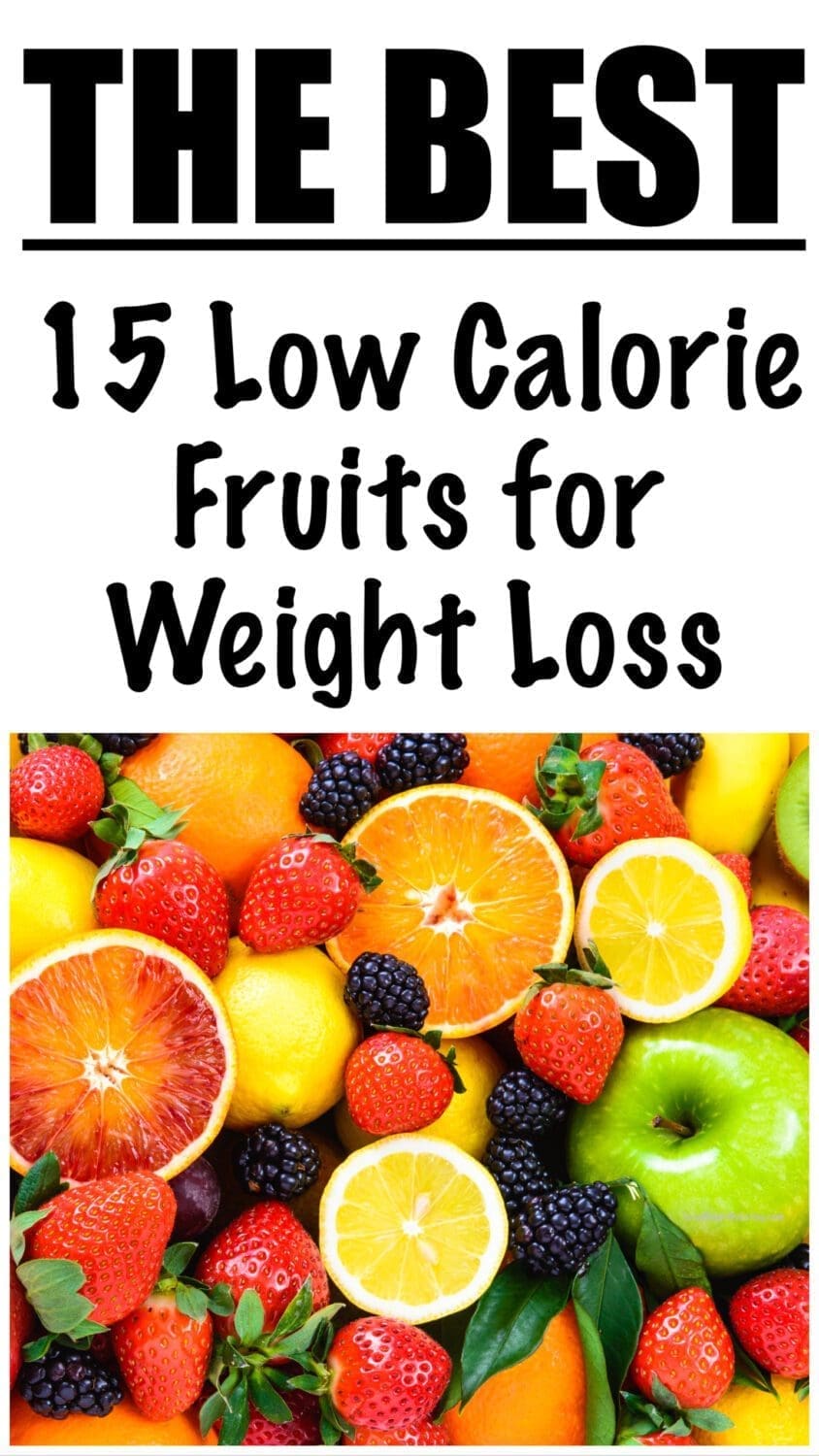Low-calorie fruits are a great addition to any healthy diet, especially if you are looking to lose weight.
They are packed with essential vitamins and minerals, antioxidants, and fiber, which can help you feel full and satisfied while also improving your overall health.
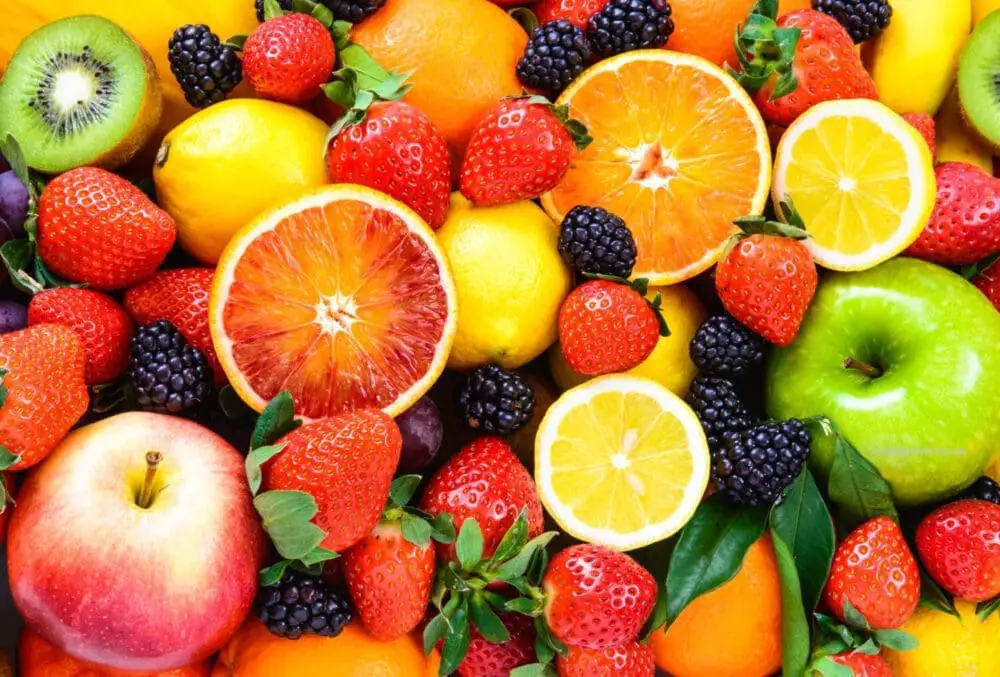

In this guide, I’ll share the top low-calorie fruits, their nutritional benefits, and how they can help you reach your weight loss goals. And if you’re looking for Low Calorie Veggies too click here!
1. Berries (49 Calories)
Berries are some of the healthiest low-calorie fruits available. They are packed with antioxidants, vitamins, and fiber, and are known to help reduce inflammation and improve heart health.
Some of the best low-calorie berries include strawberries, raspberries, blueberries, and blackberries.
One cup of strawberries contains only 49 calories, while a cup of raspberries has 64 calories. These fruits are also versatile and can be eaten fresh, frozen, or added to smoothies, yogurt, or oatmeal.
2. Citrus Fruits (62 Calories)
Citrus fruits are another great low-calorie option that is packed with vitamins and minerals. They are also rich in antioxidants, which can help protect your body from damage caused by free radicals.
Oranges, grapefruits, and tangerines are some of the best citrus fruits for weight loss. They are low in calories and high in fiber, which can help keep you full and satisfied for longer periods.
A medium-sized orange contains only 62 calories, while a grapefruit has 64 calories. These fruits can be eaten fresh or added to salads, smoothies, or marinades.
3. Apples (95 Calories)
Apples are one of the most popular fruits globally, and for good reason. They are low in calories, high in fiber, and packed with essential nutrients, making them a perfect option for weight loss.
This wonderful fruit is also rich in antioxidants, which can help prevent chronic diseases such as diabetes, heart disease, and cancer.
A medium-sized apple contains only 95 calories and can be eaten fresh, cooked, or added to salads, oatmeal, or smoothies.
4. Melons (46 Calories)
Melons are low in calories and high in water content, making them an excellent option for those looking to lose weight.
Watermelon, honeydew, and cantaloupe are some of the best low-calorie melons, with a cup of diced watermelon containing only 46 calories.
Melons are also rich in essential vitamins and minerals such as vitamin C and potassium, which can help regulate blood pressure and support healthy kidney function. These fruits are best eaten fresh or added to salads, smoothies, or salsa.
5. Peaches (59 Calories)
Peaches are a delicious and nutritious low-calorie fruit that is rich in vitamins A and C, fiber, and potassium.
One medium-sized peach contains only 59 calories and can be eaten fresh or added to smoothies, salads, or yogurt.
Peaches are great for improving digestion, boosting your immune system, and for boosting heart health too. They are a wonderful low calorie snack, and you can find frozen peach slices when they are out of season.
6. Pears (101 Calories)
Pears are another excellent low-calorie fruit option that is rich in fiber, vitamin C, and copper.
One medium-sized pear contains only 101 calories and can be eaten fresh or added to oatmeal, smoothies, salads, and desserts.
Great for improving gut health, boosting heart health and aiding in weight loss. Pears have natural anti-inflammatory properties, and are a great snack anytime!
7. Kiwi (61 Calories)
Kiwi is a tropical low-calorie fruit that is rich in vitamin C, fiber, and potassium.
One medium-sized kiwi contains only 61 calories and can be eaten fresh or added to smoothies, yogurt, or salads.
This little fuzzy fruit supports heart health, boosts digestion and helps build up your immunity. Plus they are packed with fat burning vitamin C!
8. Grapes (104 Calories)
Grapes are a sweet and juicy low-calorie fruit that is rich in antioxidants, vitamins, and fiber.
One cup of grapes contains only 104 calories and can be eaten fresh or frozen.
Grapes can help ward off cancer, lower blood pressure, and protect against diabetes. They are also great for brain health, they reduce cholesterol and boost immunity!
9. Pineapple (82 Calories)
Pineapple is a tropical low-calorie fruit that is rich in vitamin C, manganese, and bromelain.
A cup of fresh pineapple contains only 82 calories and can be eaten fresh or added to smoothies, salads, or salsa.
One of my favorite metabolism boosting fruits, pineapple also helps with post workout recovery while it helps boost weight loss. This fruit also aids digestion, fights inflammation and releases pain!
10. Plums (46 Calories)
Plums are a delicious low-calorie fruit that is rich in vitamin C, fiber, and antioxidants.
One medium-sized plum contains only 46 calories and can be eaten fresh or added to oatmeal, yogurt, salads, and smoothies.
Plums are not just low in calories, the naturally reduce anxiety! Also great for reducing blood sugar, inflammation and constipation, these little fruits are great for your body.
11. Cherries (97 Calories)
Cherries are a sweet and juicy low-calorie fruit that is rich in antioxidants, vitamins, and fiber.
One cup of cherries contains only 97 calories and can be eaten fresh or frozen. And are great to snack on, and to add to smoothies.
Dark red cherries are one of my personal favorites. They naturally ease pain and are known as “nature’s ibuprofen” as they also reduce inflammation!
12. Papaya (55 Calories)
Papaya is a tropical low-calorie fruit that is rich in vitamin C, fiber, and papain.
One cup of fresh papaya contains only 55 calories and can be eaten fresh or added to smoothies, salads, or salsa.
Known for it’s constipation releasing properties, this sweet fruit can really clear you out! Papaya is also packed with metabolism boosting Vitamin C!
13. Mango (99 Calories)
Mango is a tropical low-calorie fruit that is rich in vitamin C, vitamin A, and fiber.
One cup of fresh mango contains only 99 calories and can be eaten fresh or added to smoothies, salads, or salsa.
Mango is a super metabolism boosting ingredient! Packed with vitamin C it can really speed up fat loss. This fruit also keeps you full longer with all the fiber, and can help prevent cancer and heart disease!
14. Guava (38 Calories)
Guava is a tropical low-calorie fruit that is rich in vitamin C, fiber, and antioxidants.
One medium-sized guava contains only 38 calories and can be eaten fresh or added to smoothies, salads, or yogurt.
This tropical fruit boosts immunity, boosts weight loss, lowers blood sugar and can even help relieve PMS cramps!
15. Apricots (17 Calories)
Apricots are a delicious and nutritious low-calorie fruit that is rich in vitamin A, vitamin C, and fiber.
One medium-sized apricot contains only 17 calories and can be eaten fresh or added to oatmeal, smoothies, and appetizers.
Great for gut health and digestion, apricots are a great little fruit to work into your diet. They are also great for eye health and are packed with antioxidants.
Low Calorie Fruit Salad:
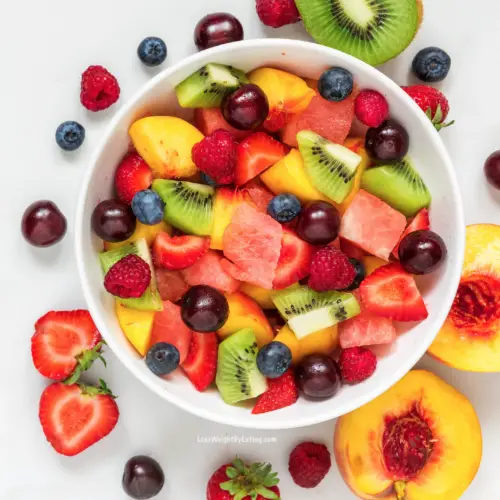

Low Calorie Fruit Salad for Weight Loss
Ingredients
Fruit Salad Recipe:
- 1 cup strawberries halved
- 1 peach pitted and cut into bite sized chunks
- 1 kiwi peeled and cut into bite sized chunks
- 1 cup blueberries
- 1 cup raspberries
- 1 cup grapes
- 1 cup watermelon cut into bite sized chunks
Fruit Salad Dressing:
- 1 orange juiced
- 1 tablespoon champagne vinegar or apple cider vinegar
- 1 teaspoon honey
Instructions
- In a small bowl, whisk the orange juice, champagne vinegar, and honey together.
- To a large bowl, combine all of the fruit.
- Pour the fruit salad dressing over the fruit, tossed together, and serve.
- You can cover with plastic wrap, and refrigerate for up to 24 hours. And you can freeze any leftovers, and add it to your morning smoothies!
Nutrition
Frequently Asked Questions (FAQ)
Low-calorie fruits are fruits that are low in calories and can be consumed in large quantities without causing significant weight gain. Examples of low-calorie fruits include berries, citrus fruits, apples, melons, peaches, pears, kiwi, grapes, pineapple, plums, cherries, papaya, mango, guava, and apricots.
Low-calorie fruits are good for you because they are packed with essential vitamins, minerals, fiber, and antioxidants that help improve overall health and reduce the risk of chronic diseases. They are also a great option for those trying to lose weight or maintain a healthy weight, as they are low in calories and can help you feel full without overeating.
Yes, low-calorie fruits can be an important part of a balanced and healthy diet. They provide essential nutrients and are low in calories, making them a great option for those looking to maintain or lose weight. It is recommended to consume a variety of fruits and vegetables as part of a balanced diet.
There are many ways to incorporate low-calorie fruits into your diet, such as eating them as a snack, adding them to smoothies, salads, oatmeal, or yogurt, or using them as a natural sweetener in baked goods or desserts. You can also freeze them for a refreshing and healthy dessert.
Yes, low-calorie fruits can help with weight loss as they are low in calories and can help you feel full without overeating. Incorporating low-calorie fruits into your diet can also help reduce overall calorie intake and increase nutrient intake, which can lead to weight loss and improved health.
Yes, some low-calorie fruits such as melons, pineapples, and grapes are high in natural sugars. However, they are still a healthy option as they provide essential nutrients and fiber. It is important to consume these fruits in moderation as part of a balanced diet.
Yes, low-calorie fruits are packed with essential nutrients and antioxidants that can help reduce the risk of chronic diseases such as heart disease, diabetes, and cancer. Incorporating a variety of low-calorie fruits into your diet can provide a wide range of health benefits.
What to Read Next:


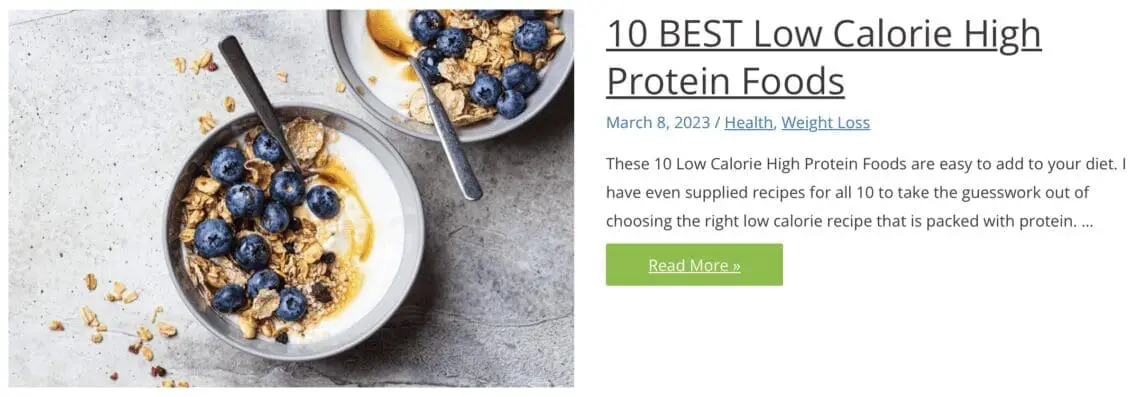

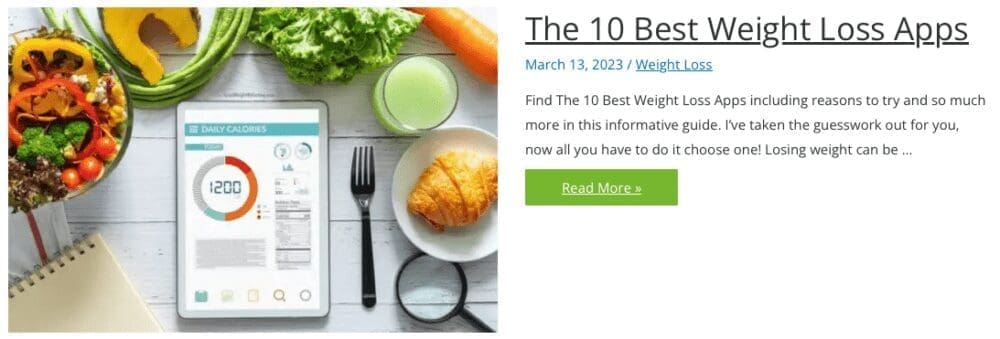

Lose Weight By Eating Cookbooks


Share this Low Calorie Article:
